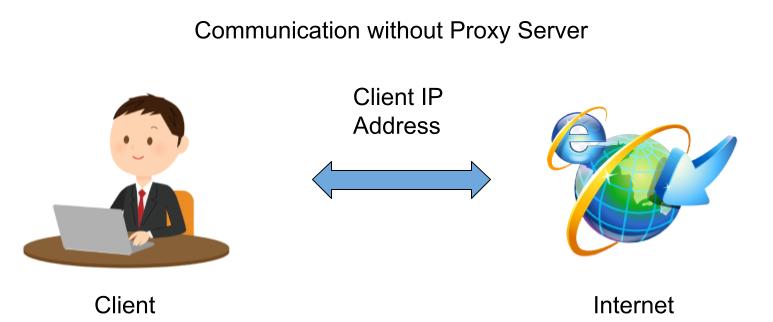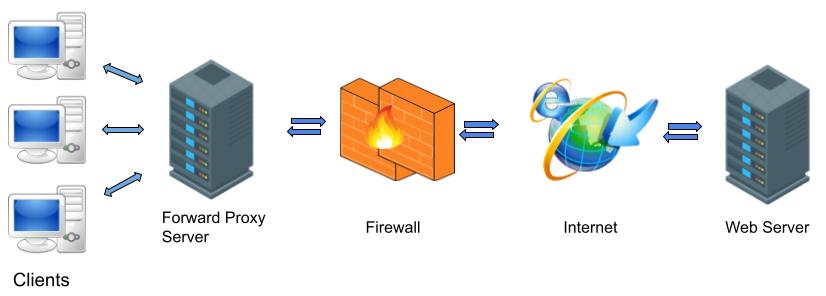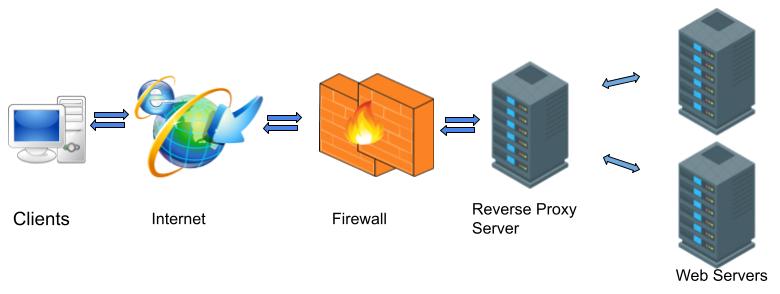What is Proxy Server ?
Proxy means “to act on behalf of another,” and a proxy server acts on behalf of the user. A proxy server is a computer system that works as a relay between user and server. Proxy accepts the incoming traffic from the user and forwards those traffics to the destination server. It referred to as an “intermediary” because it goes between end-users and the web pages. Every Proxy server has its own IP address. It separates the user system and web server from the internet.
Present day proxy servers do much more than just forward user requests, Proxy servers act as a firewall and web filter, provide shared network connections, and cache data to speed up common requests and provide a high level of privacy. A good proxy protect users and their private internal network from hackers and attackers that lives in the wild internet.
How Does The Proxy Server Works ?
Every computer has its own IP address which it uses to communicate with outside world. Similarly, the proxy server has its own IP address. when you send a web request on the internet, it is routed to the proxy server first, The Proxy sends a request on your behalf to the internet and then collect the data and make it available to you. A proxy hides your IP address and uses its own IP to communicate with internet. So, the webserver will be unable to fetch your real location in the world.
Let suppose you want to visit the Facebook website without proxy, you just need to open your web browser and type facebook.com then your browser sends a web request to the Facebook server with your machine IP address and Facebook server responds to your request. But in this communication method your real location is exposed.

Let suppose the same scenario, but this time you are using a proxy. When you send a web request to the Facebook server, it is routed to the proxy first, and Proxy sends a request on your behalf to the Facebook server and then collect the data and make it available to you. In this communication your real location is not exposed because proxy using its own IP to send and receive requests.

Types of Proxy Servers
1 Forward Proxy Server
A forward proxy is the most recognized form of a proxy and is generally used to pass requests from a secured, private network to the unsecured Internet through a firewall. A forward proxy server placed in front of client and used to protect the client system. When client send a connection request to the web server on the Internet, its requests have to pass through the forward proxy first. forward proxy can be allowed or denied the request depending upon the proxy’s setting. If allowed, then the request is forwarded to the firewall and then to the web server. when the web server responds, it addresses its response to the proxy. When forward proxy receives the response it sends that response to the client that made the request.
Benefits of Forward Proxy
1. Forward Proxy is good in content filtering (Restrict website) and caching.
2. It is also good in logging and monitoring.

2 Reverse Proxy Server
Unlike a forward proxy, which placed in front of clients, a reverse proxy is positioned in front of web servers. Reverse proxy to listen to the request made by the client and redirect to the particular web server which is present on different servers. Unlike a traditional proxy server, which is used to protect clients, a reverse proxy is used to protect servers. A reverse proxy is a server that accepts a request from a client, forwards the request to another one of many other servers, and returns the results from the server that actually processed the request to the client. A client only communicates directly with the reverse proxy and it does not know that some other server actually processed its request.
Benefits of Reverse Proxy
1. Reverse Proxy is good in load balancing and caching.
2. It protects web servers from DDoS attack.
3. It is also good in authentication and validation.

Advantages Of Using Proxy Servers
There are lots of benefits to using a proxy server in your internal network. As an organization or corporate, you should know these advantages to understand how a proxy can help you. Some of advantages given below.
- Proxy server uses its own IP address to access internet instead of client IP, So it makes client anonymous online. It helps users to browse the Internet privately; a user can keep their personal information and browsing habits private.
- Proxy unblock restricted web content and services. Many websites have some country restrictions. In those cases, if you want to access those websites, the proxy will help you in doing that.
- Proxy saves bandwidth by caching files or compressing incoming traffic.
- Proxy server loads web pages faster because it stores caches of websites.
- Unlike the proxy can be used to access restricted websites, companies or organization can also use proxy to restrict websites and webpages. So that their employee cannot access some malicious websites.
- With the help of proxy, corporates can use the logs generated by proxy server to monitor all web requests, and analyze how much time is being spent on specific sites. Organization keep an eye on their employees activities.
Disadvantages Of Using Proxy Server
- Proxy connection is not encrypted like VPN connection. When you are using unencrypted connections with a proxy server the server can modify the responses.
- When you are using proxy for safe internet access, then all your traffic goes through a proxy server first. So there is chances of single point failures means if proxy facing some issue then your whole internal network will be affected.
- Proxy may not always be compatible with your internal private network. Both proxy and private network requires their own configurations. Some times proxies are not compatible with ports & protocols which is used by your internal network.
- Configuration and maintenance of a proxy are very expensive. Small businesses cannot afford it. And configurations of a proxy can be quite difficult. Highly skilled person required to setup the proxy.

